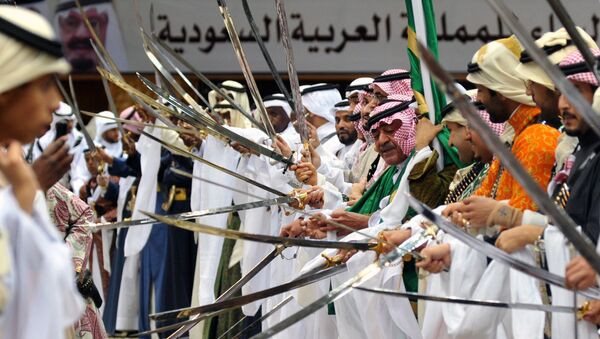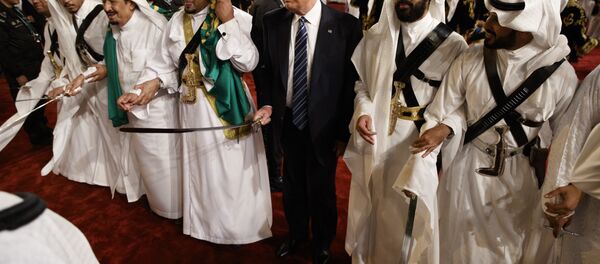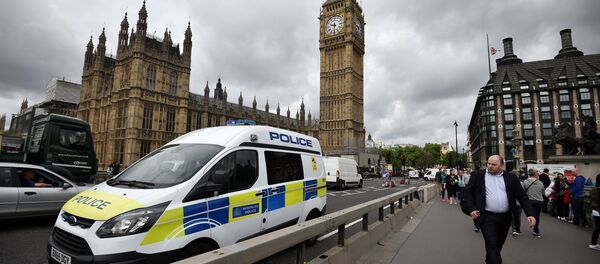The Qatar diplomatic crisis has prompted a heated debate among international observers, with the most confusing part of the unfolding controversy being that its Gulf neighbors, particularly Saudi Arabia, accusing Doha of sponsoring terrorism.
Early Monday morning, Bahrain, Saudi Arabia, the United Arab Emirates (UAE), and Egypt cut diplomatic ties with Qatar in a coordinated move. The countries closed land, air and sea passage to all vessels and vehicles coming from or going to Qatar.
"The Government of the Kingdom of Saudi Arabia, exercising its sovereign rights guaranteed by the international law, and protecting national security from the dangers of terrorism and extremism, decided to sever diplomatic and consular relations with the State of Qatar," Riyadh's official statement read.
In response, the Ministry of Foreign Affairs of the State of Qatar expressed its "deep regret and surprise" at the decision of its Gulf neighbors.
"Qatar is an active member of the Gulf Cooperation Council [GCC] and is fully committed to its charter. Qatar respects the sovereignty of other nations and does not interfere in their internal affairs, and it has fulfilled its role in fighting terrorism and extremism," the statement said as quoted by Al-Jazeera.
Reportedly, the trigger behind the coordinated move was Sheikh Tamim Al Thani's remark, quoted by the Qatar News Agency (QNA), that Iran was an "Islamic power that cannot be ignored."
Although Qatar rushed to denounce the report as fabricated by "unknown" hackers, the damage was done and Saudi Arabia's Okaz newspaper lambasted Doha for siding "with the enemies of the nation."
For his part, US President Donald Trump also pointed the finger at Qatar.
During my recent trip to the Middle East I stated that there can no longer be funding of Radical Ideology. Leaders pointed to Qatar — look!
— Donald J. Trump (@realDonaldTrump) 6 июня 2017 г.
"During my recent trip to the Middle East, I stated that there can no longer be funding of Radical Ideology. Leaders pointed to Qatar — look!" Trump tweeted.
So good to see the Saudi Arabia visit with the King and 50 countries already paying off. They said they would take a hard line on funding…
— Donald J. Trump (@realDonaldTrump) 6 июня 2017 г.
…extremism, and all reference was pointing to Qatar. Perhaps this will be the beginning of the end to the horror of terrorism!
— Donald J. Trump (@realDonaldTrump) 6 июня 2017 г.
"So good to see the Saudi Arabia visit with the King and 50 countries already paying off. They said they would take a hard line on funding… extremism and all reference was pointing to Qatar. Perhaps this will be the beginning of the end to the horror of terrorism!" he added.
However, according to Israeli political analyst Avigdor Eskin, the latest developments have no relation to the fight against terrorism.
"One should not deceive himself about the current events. This is not a move against terrorism," Eskin told Sputnik.
Eskin referred to the email purportedly written by Hillary Clinton to John Podesta on August 17, 2014, and published by WikiLeaks that read: "We need to use our diplomatic and more traditional intelligence assets to bring pressure on the governments of Qatar and Saudi Arabia, which are providing clandestine financial and logistic support to ISIL [Daesh] and other radical Sunni groups in the region."
In this context, Riyadh's accusations against Doha sound hypocritical.
"There is a lot of hypocrisy not only on Riyadh's side but on the US side as well," Eskin noted, recalling that Trump had repeatedly lambasted Saudi Arabia during his election campaign.
"If you read the statement of the Foreign Minister of Qatar he does not imply that the current outburst of animosity was inspired by the visit of Trump. He talks about those who were whispering and inciting the US President. The existing ties between Qatar and Iran were rather exploited by the Gulf countries to convince the Americans that they are doing the right thing. The situation of mutual hatred there is usual, unfortunately," Eskin told Sputnik.
Observers say that Al Thani's remark about Iran became the trigger for the ongoing Qatar crisis. Have the major Sunni states in the region punished Qatar for its relations with Shiite Iran?
"The relations between all GCC countries and Egypt are extremely tangled," Eskin responded. "One must remember the role of Qatar in the Muslim Brotherhood takeover in Egypt. Al Jazeera TV is based in Doha. So, Qatar provided both the financial and media support to the Islamists who actually seized the power in Egypt for a time."
Did Doha play a significant role in the Arab Spring in general and the Syrian civil war in particular?
"The role of Qatar in the Arab Spring is immense," Eskin stressed. " Al Jazeera alone is the worthy equivalent of many billions in support. The spiritual guidance of Sheikh Yusuf Al-Qardawi is also from Doha. This preacher defined Russia as enemy number one of the Muslim world and also praised Hitler and his treatment of Jews. The fingerprints of Qatar are obvious in Syria as well. Doha was behind the decision of Hamas to turn weapons against [Syrian President Bashar] Assad's forces."
Still, "the Saudis are far ahead in supporting the most radical ideological centers in Europe and around the world," the Israeli political analyst remarked adding that "the Saudis are not training terrorists and not paying directly for terror attacks but they have created the most dangerous and effective radical infrastructure."
Although the situation has seemingly become dire for Qatar, it is not the first time that the Gulf States have cracked down on their neighbor. However, the countries of the region had managed to solve their previous crises.
"I want to remind [you] that there was a crisis between Qatar and the other Gulf states in 2014 and it was resolved. Therefore one should wait and give a chance to the current initiatives of Kuwait to appease the sides," Eskin told Sputnik, referring to a March 2014 conflict when Saudi Arabia, the UAE, and Bahrain suspended ties with Qatar over its support for the Muslim Brotherhood; eight months later relations between the countries were resumed.






